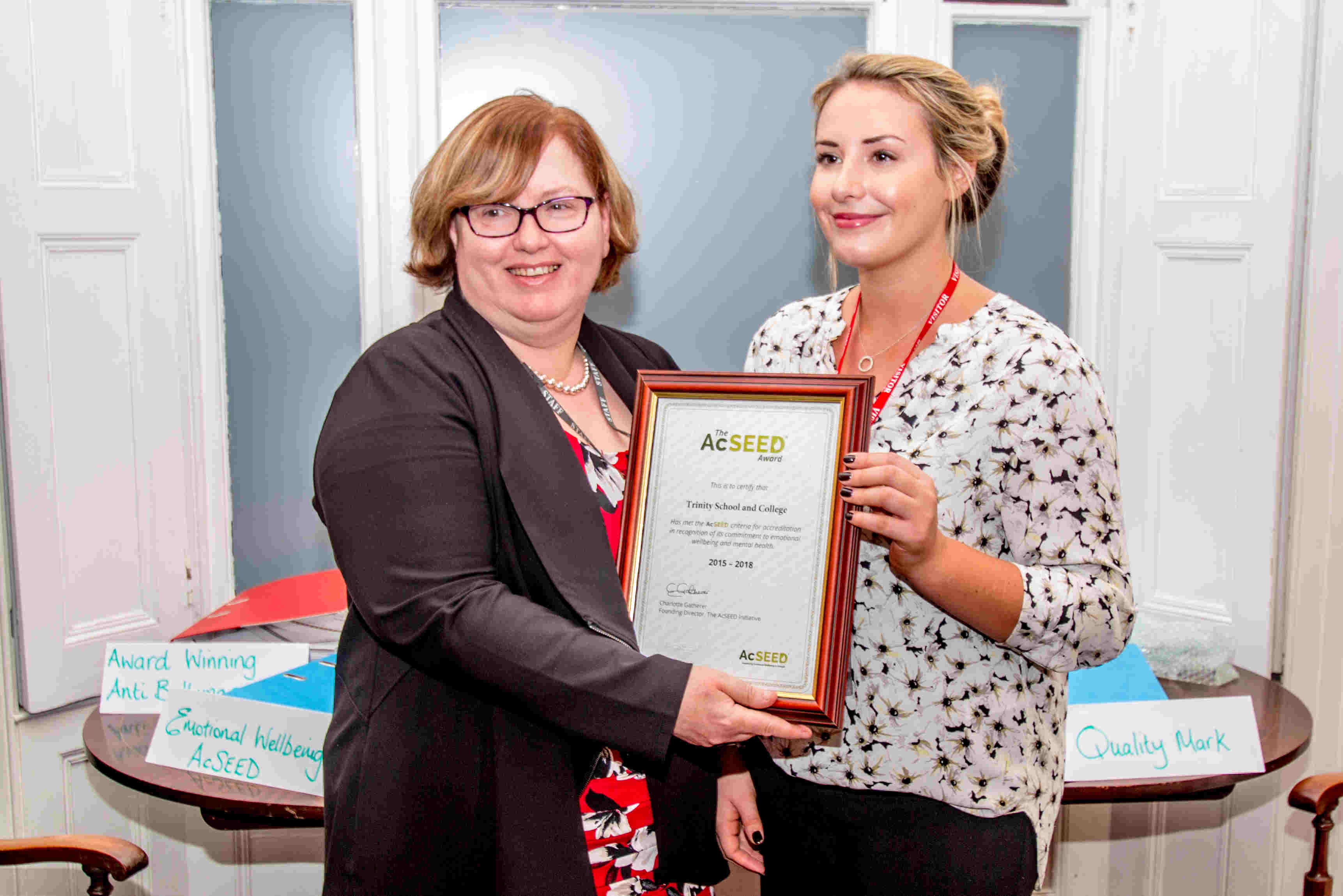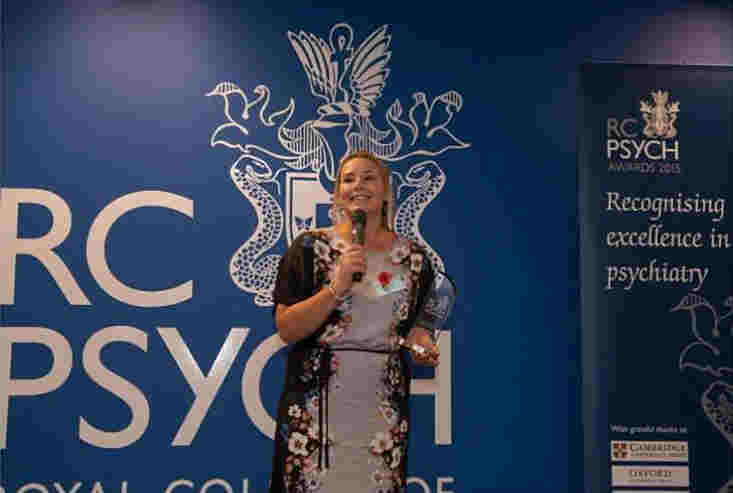Saturday 20th April 2024
Subscribe to the
AcSEED mailing list
This is how we share information and good practices relating to mental health and wellbeing support in schools and colleges
What's New
 Sherborne House Accreditation
Sherborne House Accreditation
16th January 2024
Sherborne House School in Chandlers Ford, Hampshire receive AcSEED Award
 The AcSEED Newsletter
The AcSEED Newsletter
28th July 2022
AcSEED Newsletter for July 2022
 UK Government blog
UK Government blog
21st July 2022
What we are doing to improve the mental health of children and young people
 AcSEED at MHW Show 2022
AcSEED at MHW Show 2022
11th May 2022
AcSEED were a presenter and exhibitor at the Mental Health and Wellbeing show in Cardiff on 10th May 2022
 Wistaston Accreditation
Wistaston Accreditation
25th April 2022
Wistaston Church Lane Academy in Crewe, Cheshire receive AcSEED Award
 Gorse Hall Accreditation
Gorse Hall Accreditation
7th April 2022
Gorse Hall Primary and Nursery School in Stalybridge, Cheshire receive AcSEED Award
 Crosby High Accreditation
Crosby High Accreditation
7th April 2022
Crosby High School in Crosby, Merseyside receive AcSEED Award
 St Olave's Accreditation
St Olave's Accreditation
1st April 2022
St Olave's Grammer School in Orpington, Kent receive AcSEED Award
 St Paul's Accreditation
St Paul's Accreditation
19th August 2021
St Paul's Church of England Primary School in Stalybridge, Cheshire receive AcSEED Award
 The AcSEED Newsletter
The AcSEED Newsletter
14th December 2020
AcSEED Newsletter for December 2020
 On-line Wellbeing Support
On-line Wellbeing Support
11th December 2020
Kooth: An on-line Mental Health Support Platform
 Mental Health in Schools Conference
Mental Health in Schools Conference
11th November 2020
Report from the Westminster Insight conference on Mental Health and Wellbeing in Schools
 Fairfield Road Accreditation
Fairfield Road Accreditation
20th October 2020
Fairfield Road Primary School receive AcSEED Award
 Newport Girls' get AcSEED Award
Newport Girls' get AcSEED Award
31st August 2020
Congratulations to Newport Girls' High School in Shropshire ...
 First AcSEED Wellbeing Centre
First AcSEED Wellbeing Centre
25th June 2019
Trinity School and College opens the first AcSEED Wellbeing Centre

The AcSEED Newsletter
January 2016
Editorial
Welcome to the AcSEED Newsletter for Spring Term 2016. We're anticipating a busy year with many schools increasing their focus on emotional wellbeing and mental health support. It was great to be able to present the first AcSEED accreditations in 2015, but we're also excited by the number of schools that have now registered with AcSEED and are working towards accreditation. The scheme originated in Hampshire, but we are now working with schools across 11 UK counties.
Featured in this Newsletter ...
We congratulate Trinity School and College in Rochester, Kent, who were accredited with The AcSEED Award in November 2015. The Directors and staff at Trinity have understood the need for a whole school approach to wellbeing, and tailored their provisions to the specific needs of their students. Executive head teacher Elizabeth Baines noted that Trinity considered The AcSEED Award to be of particular importance as wellbeing support is a common need across all of their students.
Many schools seeking to improve their mental health and wellbeing support are looking for opportunities to collaborate with other like-minded organisations. In Hampshire a group of 18 schools have formed a wellbeing collaboration project co-ordinated by the ETC Alliance. In the article below the ETC Alliance project co-ordinators outline the motivation and approach of this wellbeing project, and highlight their ambition for all participating schools to achieve AcSEED accreditation in 2016.
We also include a blog recounting one young person's emotional trauma as they navigated through school suffering from severe acne. AcSEED aims to ensure that schools are well equipped to identify and support mental health and wellbeing challenges whatever the underlying causes.
The AcSEED Initiative was founded by young people with lived experience of emotional wellbeing and mental health challenges in school, and who have subsequently been able to identify and articulate measures that they believe may have helped to minimise their distress. The article by a young person and AcSEED volunteer (name withheld) highlights their journey from emotional challenges as a student to cover supervisor in a secondary school. It is great to hear how their personal experiences are now helping to support students, and also the emphasis on early intervention which they believe would have benefited their own situation.
Finally, we congratulate AcSEED volunteer Helen Galsworthy who received one of the prestigious annual awards from the Royal College of Psychiatrists: 'Service User Contributor of the Year 2015'.
If you would like to submit an article, letter, or notification of a future event in the AcSEED Newsletter please see the contact details below.
The AcSEED Leadership Team
AcSEED News
Trinity School and College receives AcSEED accreditation

Executive head teacher Elizabeth Baines (left) receives the award from AcSEED principal assessor Helen Galsworthy.
Congratulations to Trinity School and College in Rochester, Kent, who were presented with The AcSEED Award at a ceremony held to mark the occasion on Friday 27th November 2015. Trinity is the first school in the South East, and the first independent school, to receive AcSEED accreditation.
Representatives of The AcSEED Initiative said "It's great to see that Trinity School and College have fully embraced a whole school approach to wellbeing which is a fundamental principle of the AcSEED assessment framework. The directors and staff have an excellent understanding of their student's needs, and have tailored their emotional wellbeing and mental health provisions accordingly".
In receiving the award on behalf of Trinity School and College, Executive head teacher Elizabeth Baines paid tribute to the knowledge, skills, and dedication of her staff. She also noted that whilst the school was well recognised for their specialist expertise on learning difficulties, she was particularly pleased to be accredited with The AcSEED Award as emotional wellbeing and mental health support was the one common thread through the needs of all students at Trinity.
Read the full story here.
The ETC Alliance collaborative wellbeing project
By: Cheron Macdonald and Liz Lee
The ETC Alliance based at Wildern Teaching School is funding a collaborative project 'Supporting Mental Health and Well-being in School' following concerns raised at strategic level about staff indicating a lack of knowledge or confidence when working with children and young people with mental health difficulties and eagerness to remedy this. The project was launched on 10th May 2015 with the aims of: developing a whole school approach and policy, increasing awareness, knowledge and skills of all staff and establishing clear referral procedures and proactive work with supporting agencies. At a subsequent ½ day workshop in July 2015 with speakers from AcSEED and Solent Mind Heads Up, 18 schools and 37 staff have committed to taking the project further, working together to develop and improve strategies and expertise in this field.
This project is being led by Cheron Macdonald, SENCO at Wyvern College and Liz Lee, SLE for ETC Alliance, Assistant Head at Oak Lodge School in partnership with CAMHs and AcSEED, through further interactive workshops and smaller group coaching or mentoring.
The recent whole day workshop in November 2015, delivered by Dr Terri Brown and Dan Batchelor from the Eastleigh CAMHs Team, covering topics requested by participants: understanding and managing anxiety in a school setting, depression, low mood and self-harm received very positive feedback.
We are now over half-way through the project and participants are developing mental health and well-being policies and planning how to cascade key information back to staff in their respective schools.
The aim for all participating schools is to have gained an AcSEED accreditation by the end of the project in June 2016.
It has been really valuable working alongside Charlotte and Nick Gatherer in making sure we are raising mental health awareness
and confidence of staff in supporting pupils in school. We look forward to updating AcSEED on the schools who have gained the
accreditation and the next steps for our project.
Blog: The sensitive subject of acne
By: Michael
I couldn't say the word "acne" out loud until I was an adult. It's a very emotional thing, your skin, and acne was doing me such emotional harm at school that I was unable to ever speak about it, even though I really needed to.
The biggest misconception to do with acne is 'they are just spots'. I would never underestimate the multiple impact of acne on anybody's school life. It can affect academic achievement, socialising, school trips, participation in sport, eating, overall mood, self-esteem, attendance, in fact every aspect of emotional wellbeing.
Despite acne being the most mainstream physical condition to affect pupils at school, there is a silence surrounding acne. Sadly, that silence is self-perpetuating as acne continues to be a subject largely ignored compared to, say, body image. The silence is twofold. It is the silence of pupils who are so deeply upset by acne that they bottle everything up and so friends, parents and teachers are completely unaware there is a problem. Also, there is the silence from schools in recognising the nature and extent of acne's impact. I believe very strongly that schools should be proactively reaching out to pupils who may be in real distress. In being open about acne within school there is a better chance of catching pupils before they reach a possible crisis point and, as was the case with me, become traumatised by their acne.
Another misconception is that the severity of the acne equates to the degree of upset. This isn't the case. Somebody who may appear to have mild acne can be overwhelmed by it. Somebody else who may appear to have more obvious acne may be emotionally strong and pragmatic.
There are so many strands to how acne can affect a pupil, boy or girl equally, that often a pupil with acne will only feel
able to open up to somebody else who has direct experience of acne too. So, there needs to be an appreciation of this because
a common thought process is 'there's no point, they won't understand', and this overrides a student's need to share their emotions.
There is no doubt that due to the intensity of feelings generated by something as personal as a young person's own skin, the
subject of acne needs to be treated sensitively and knowledgeably by schools. For a pupil with acne, being told 'your skin
doesn't look bad to me' is not the right kind of help. There needs to be a proper awareness of how students with acne can
be affected across all school life.
The importance of early intervention: a personal perspective
By: A young person and AcSEED volunteer (name withheld)
If someone had said to me ten years ago that I would be working in a school, I don't think I would have believed them. However ten years ago I would have felt the same way if told that I would have ill mental health. One positive outcome is that I now get to use the experiences from my own mental health battle to support my work with young people who are themselves suffering. I am a cover supervisor in a secondary school, and more often than I would like I see young people with mental health problems ranging from mild anxiety around exams to anorexia and depression. School can often be a trigger for young people with mental health issues and therefore my experiences come in handy with those who are struggling.
I strongly believe there is a fine line between helping and hindering young people with wellbeing challenges. It is therefore important to be knowledgeable and up to date with current mental health trends and 'lingo', which will hopefully ensure that you do not set a foot wrong and potentially make things worse. I find the best way to do this is simply to read and to listen. I read articles all the time on young people's mental health services and how things are handled, and notice that much has changed in the 6 years since I was personally involved with CAMHS (Child and Adult Mental Health Services). I now have a much better understanding of how to react when students speak to me about their worries and struggles. Yet what I have found comes in most handy when working with a young person is simple and genuine compassion. Sometimes all young people want is to have someone listen to them, whether it's simply about their day or something more serious such as a horrible situation at home. Whatever it is they often just need to know that someone is there to listen and to know that they matter.
As I said earlier I would not have believed that I would ever end up with ill mental health because ten years ago I was the
happiest and liveliest 14 year old you could meet in my school. Not for a minute did I think anything was wrong in my life,
or that I was sad. However things can change very quickly. Within a year I developed Anorexia and depression and ever since
have struggled with my physical and mental health. You may think a year is a long time, but throughout that year all the warning
signs of my deteriorating mental and physical health went unnoticed. I believe my situation could have been much improved if
these signs had been recognised. I cannot stress enough the importance of early intervention when it comes to young people's
behavioural changes. It's a bit like teaching a child how to play nicely with their siblings - if they go wrong then getting
in early to correct the behaviour is the best way to eliminate bad habits. Mental health is the same.
AcSEED volunteer receives award from Royal College of Psychiatrists

AcSEED volunteer Helen Galsworthy receives her award from The Royal College of Psychiatrists.
Congratulations to AcSEED volunteer Helen Galsworthy who has received one of the prestigious annual awards from The Royal
College of Psychiatrists. Helen, a principal assessor with The AcSEED Initiative, received the 2015 award for 'Service User
Contributor of the Year' for her work with The Hampshire Lanterns perinatal peer support group, and with The AcSEED Initiative.
Related News
Government campaign to reduce mental health stigma for young people
In October 2015 the UK Government launched a new national anti-stigma campaign targeted at young people. Department of Health minister Alistair Burt noted that this would be the "largest ever campaign", and that the Government was also funding a Youth Mental Health Information Hub which was "... something that young people have asked for - better information about mental health, tailored specifically for them, online". Mr Burt also announced that the Government were commissioning the first national survey of children and young people's mental health since 2004.
AcSEED founder Charlotte Gatherer said "These are welcome initiatives that will contribute valuable mental health and wellbeing resources for young people. The survey results will provide much needed data to help guide wellbeing provisions in schools, though it is unfortunate that the results will not be available until 2018".
The Youth Mental Health Information Hub can be viewed
here.
To submit an article or letter for publication in The AcSEED Newsletter, or to request further information on the content of this newsletter or The AcSEED Initiative, please email us at: contact@acseed.org





